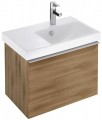Washbasin alignment
The location of the sink, nominally assumed by the design of the cabinet.
The vast majority of modern models use a
central location — this is a fairly simple and at the same time versatile option. At the same time, there are models where the sink is shifted to the
left or
right of the centre. Usually, these are design solutions in which the position of the sink is largely dictated primarily by the design style; in addition, it is worth remembering that such cabinets are usually compatible only with "native" branded washbasins. They have some practical advantages — a kind of shelf is formed on the side of the sink, convenient for temporary placement of various accessories (for example, you can put the machine there while shaving). At the same time, these advantages can hardly be called decisive.
Material
The material from which most of the pedestal body is made — with the exception of the front part (facade), the material for it is indicated separately.
— Chipboard. Abbreviation for "chipboard". Inexpensive and at the same time quite practical material used in almost all price categories of cabinets for washbasins.
The case made of chipboard does not have such an attractive appearance and somewhat worse water resistance than MDF, however, it is cheaper, and the mentioned shortcomings are easily compensated for by using various impregnations and coatings (especially since the case is not as visible as the facade).
—
chipboard. For the production of chipboard, only high-quality chipboard with a laminated surface is used. Laminate acts both as a protection of wood from moisture, and as a decorative surface. The use of laminated chipboard at the base of the body makes the cabinet more affordable in comparison with MDF models, while it turns out to be just as beautiful and spectacular as premium models made from an array of natural materials. The main disadvantage of this material is the presence of formaldehyde resins in the composition of this material.
— MDF. A common name for medium density fibreboard (from the English label MDF). Such material has a more pleasant appearance than chipboard, it is also somewhat more reliable and moisture resistant, however, it is much more ex
...pensive. Therefore, even in expensive cabinets, solid MDF cases are extremely rare.
— Wood. At the heart of the cabinet is natural wood. The wooden case characterizes the high class of the model and the status of the product. This material is highly environmentally friendly and has excellent strength characteristics. The most commonly used woods are beech, larch and cork. A cabinet made of wood is often covered on top with a layer of clear varnish or laminated coating.
— Acrylic stone. Cabinets made of acrylic stone are not only visually attractive, but also reliable, durable, and also very practical. Acrylic stone is a synthetic polymer obtained from acrylic resins, aluminium hydroxide, bulk filler and coloring pigments. This material is often called artificial stone. Artificial acrylic imitates the surface of natural stone, while it is as strong, reliable and durable as natural stone. Artificial acrylic is absolutely environmentally friendly, it does not absorb moisture or odours. Among the shortcomings, only the high price can be noted, as well as the high weight, which requires the use of more reliable fasteners than in the case of chipboard / MDF.Country of origin
The country specified as the manufacturer of the item. Note that this country often has nothing to do with the place of actual production - as a manufacturer, they most often indicate the “homeland” of the brand under which the cabinets are presented on the market, and production facilities may be located in another country. However, this cannot be called an unequivocal deception: conscientious manufacturers, as a rule, carefully monitor the quality of their products, regardless of where exactly they are produced.
We also note that data on the country of origin is often used for advertising purposes: some countries (especially highly developed ones) look more preferable for buyers in terms of the origin of the goods. But here, too, everything is very conditional: "unpopular" countries may well produce goods of not worse quality and at the same time at a lower cost (without overpaying for a "solid name"). Therefore, in any case, it is worth focusing primarily not on geography, but on the general reputation of a particular company or brand. In this niche, in addition to the domestic manufacturer, the most popular manufacturers are
Germany,
Spain,
Italy,
Poland,
Slovenia,
France,
the Czech Republic,
Switzerland.

